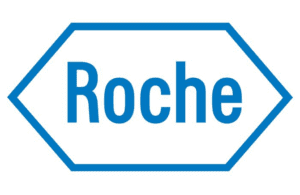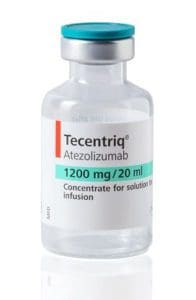 Roche (OTCQX:RHHBY) has voluntarily withdrawn its application for FDA accelerated approval for the monoclonal antibody Tecentriq (atezolizumab) in combination with chemotherapy to treat unresectable locally advanced or metastatic triple-negative breast cancer (mTNBC) with tumors expressing programmed death-ligand 1 (PD-L1).
Roche (OTCQX:RHHBY) has voluntarily withdrawn its application for FDA accelerated approval for the monoclonal antibody Tecentriq (atezolizumab) in combination with chemotherapy to treat unresectable locally advanced or metastatic triple-negative breast cancer (mTNBC) with tumors expressing programmed death-ligand 1 (PD-L1).
Earlier this month, Roche won priority review for Tecentriq for people with non-small cell lung cancer (NSCLC) after surgery and platinum-based chemotherapy involving tumors in which at least 1% of cells express PD-L1.
Roche decided to pull its application for mTNBC after consulting with FDA. According to Roche, FDA had determined that it had concluded it is no longer appropriate to maintain the accelerated approval given recent changes in the mTNBC treatment landscape.
 The company notes that its decision only applies to mTNBC in the U.S. and that the withdrawal is not related to new information related to the safety or efficacy of Tecentriq.
The company notes that its decision only applies to mTNBC in the U.S. and that the withdrawal is not related to new information related to the safety or efficacy of Tecentriq.
FDA initially granted Tecentriq accelerated approval status for mTNBC in March 2019.
Last year, Tecentriq generated $2.9 billion in revenue.
Tecentriq first scored an FDA approval in May 2016 for treating locally advanced and metastatic urothelial carcinoma. The approval covered patients whose cancer had progressed during or following platinum-based chemotherapy or within 12 months of neoadjuvant or adjuvant treatment with platinum-based chemotherapy.
Approval for mTNBC depended on progression-free survival (PFS) results from the Phase 3 IMpassion130 study. That study, however, did not meet its primary PFS endpoint.
In April, FDA’s advisory Oncologic Drugs Advisory Committee voted seven to two in support of maintaining the accelerated approval of atezolizumab with nab-paclitaxel (Abraxane) for treating adults with unresectable, locally advanced or metastatic triple-negative breast cancer with tumors expressing PD-L1.
Filed Under: clinical trials, Drug Discovery, Oncology



